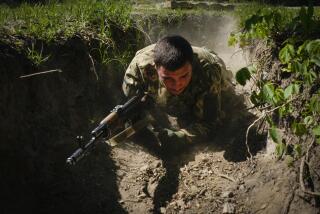Ukraine Adopts New Constitution
- Share via
KIEV, Ukraine — After a marathon 23-hour session, the Ukrainian parliament adopted the country’s first post-Soviet constitution Friday, ending four years of resistance by Communists and averting a showdown with President Leonid D. Kuchma.
“Wisdom has triumphed,” Kuchma proclaimed after the 315-36 vote to approve the long-awaited national charter.
Only two days earlier, left-wing deputies had blocked approval of key provisions, prompting the president to threaten a national referendum that would have deprived the parliament of a final say on the constitution.
“This would have taken much longer without that pressure,” said Vyacheslav Chornovil, leader of the rightist Rukh party, outside the parliament where deputies gathered in a euphoria not seen since Ukraine declared independence five years ago.
The new constitution enshrines Ukrainian as the sole state language in the country of 52 million and eliminates some Soviet legal legacies by guaranteeing the rights to own private property--including land--and to engage in business.
While retaining the existing one-chamber parliament, it grants broad authority to the executive branch, including the power to issue economic decrees during a three-year transition period.
Many lawmakers expressed hopes that the document’s adoption will encourage foreign investors who were deterred by the uncertain legal climate.
The first attempt to adopt a post-Soviet constitution in 1992 foundered on the controversial issues of language, property and executive power.
Dozens of blue-and-yellow flags--sure tickets to the gulag in Soviet times--fluttered outside all government buildings after the morning vote and parliament’s declaration of a national holiday.
Those colors, and Ukraine’s trident emblem, were the most bitterly disputed issues during the all-night debate. Communist deputies, who insisted on red in the flag and the hammer and sickle in the emblem, staged a two-hour walkout.
The provision finally passed at 3 a.m. when it was packaged with an amendment leaving Crimean autonomy intact.
Earlier drafts trimmed the Black Sea peninsula’s powers, and some deputies feared they had paid too high a price for the nationalist symbols.
A clause banning foreign military bases could also have unpredictable consequences for Ukrainian-Russian negotiations over the Black Sea Fleet. Since January, the former Soviet naval force has been legally Russian, but talks on basing it in the Crimean port of Sevastopol have bogged down over the terms of the lease.
More to Read
Sign up for Essential California
The most important California stories and recommendations in your inbox every morning.
You may occasionally receive promotional content from the Los Angeles Times.













